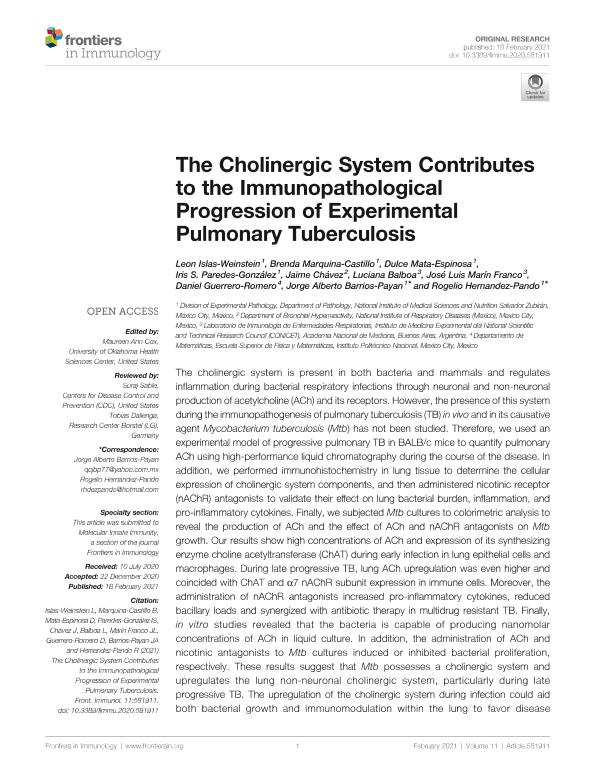Artículo
The Cholinergic System Contributes to the Immunopathological Progression of Experimental Pulmonary Tuberculosis
Islas Weinstein, Leon; Marquina Castillo, Brenda; Mata Espinosa, Dulce; Paredes González, Iris S.; Chávez, Jaime; Balboa, Luciana ; Marin Franco, Jose Luis
; Marin Franco, Jose Luis ; Guerrero Romero, Daniel; Barrios Payan, Jorge Alberto; Hernandez Pando, Rogelio
; Guerrero Romero, Daniel; Barrios Payan, Jorge Alberto; Hernandez Pando, Rogelio
 ; Marin Franco, Jose Luis
; Marin Franco, Jose Luis ; Guerrero Romero, Daniel; Barrios Payan, Jorge Alberto; Hernandez Pando, Rogelio
; Guerrero Romero, Daniel; Barrios Payan, Jorge Alberto; Hernandez Pando, Rogelio
Fecha de publicación:
02/2021
Editorial:
Frontiers Research Foundation
Revista:
Frontiers in immunology
ISSN:
1664-3224
Idioma:
Inglés
Tipo de recurso:
Artículo publicado
Clasificación temática:
Resumen
The cholinergic system is present in both bacteria and mammals and regulates inflammation during bacterial respiratory infections through neuronal and non-neuronal production of acetylcholine (ACh) and its receptors. However, the presence of this system during the immunopathogenesis of pulmonary tuberculosis (TB) in vivo and in its causative agent Mycobacterium tuberculosis (Mtb) has not been studied. Therefore, we used an experimental model of progressive pulmonary TB in BALB/c mice to quantify pulmonary ACh using high-performance liquid chromatography during the course of the disease. In addition, we performed immunohistochemistry in lung tissue to determine the cellular expression of cholinergic system components, and then administered nicotinic receptor (nAChR) antagonists to validate their effect on lung bacterial burden, inflammation, and pro-inflammatory cytokines. Finally, we subjected Mtb cultures to colorimetric analysis to reveal the production of ACh and the effect of ACh and nAChR antagonists on Mtb growth. Our results show high concentrations of ACh and expression of its synthesizing enzyme choline acetyltransferase (ChAT) during early infection in lung epithelial cells and macrophages. During late progressive TB, lung ACh upregulation was even higher and coincided with ChAT and α7 nAChR subunit expression in immune cells. Moreover, the administration of nAChR antagonists increased pro-inflammatory cytokines, reduced bacillary loads and synergized with antibiotic therapy in multidrug resistant TB. Finally, in vitro studies revealed that the bacteria is capable of producing nanomolar concentrations of ACh in liquid culture. In addition, the administration of ACh and nicotinic antagonists to Mtb cultures induced or inhibited bacterial proliferation, respectively. These results suggest that Mtb possesses a cholinergic system and upregulates the lung non-neuronal cholinergic system, particularly during late progressive TB. The upregulation of the cholinergic system during infection could aid both bacterial growth and immunomodulation within the lung to favor disease progression. Furthermore, the therapeutic efficacy of modulating this system suggests that it could be a target for treating the disease.
Palabras clave:
ACETYLCHOLINE
,
CHOLINERGIC SYSTEM
,
MYCOBACTERIUM TUBERCULOSIS
,
TUBERCULOSIS
Archivos asociados
Licencia
Identificadores
Colecciones
Articulos(IMEX)
Articulos de INST.DE MEDICINA EXPERIMENTAL
Articulos de INST.DE MEDICINA EXPERIMENTAL
Citación
Islas Weinstein, Leon; Marquina Castillo, Brenda; Mata Espinosa, Dulce; Paredes González, Iris S.; Chávez, Jaime; et al.; The Cholinergic System Contributes to the Immunopathological Progression of Experimental Pulmonary Tuberculosis; Frontiers Research Foundation; Frontiers in immunology; 11; 2-2021; 1-14
Compartir
Altmétricas



